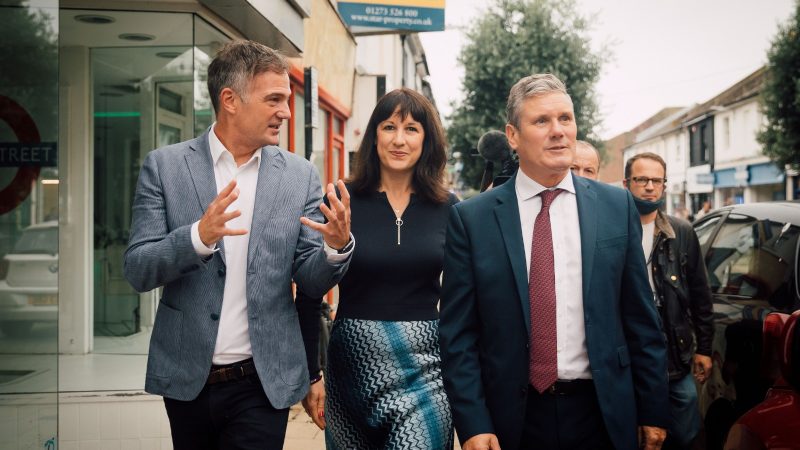
Policies in isolation do not win elections – and they won’t win Labour the next one.
This has been evident at the ballot box, and it was a major finding from the conversations Renaissance held in 2021 with 60 voters who switched from Labour to the Conservatives in either 2017 or 2019.
Even if popular in themselves, policies in isolation received cynical responses with voters viewing them as promises that are there to be broken by untrustworthy politicians. Yet broader arguments about the state of Britain and Labour’s ambitions for its future were demonstrably more persuasive.
For this reason Keir Starmer’s five ‘missions‘ deserve more credit from commentators. But our findings particularly illustrate why Rachel Reeves’s speech in Washington DC – complete with her accompanying Labour Together publication – amounts to an absolute game-changer in readying Labour for both an election campaign and government.
The Shadow Chancellor set out in stark terms a story about how dramatically the world has changed since the 1990s, when Labour last won from opposition.
“Globalisation as we know it is dead; we now live in an age of insecurity where tensions are rising between two world powers, America and China”, Reeves declared.
“We must care about where things are made and who owns them. [We need] a more active state, one that is willing to invest in building the capacity of the industries that will determine the nation’s success tomorrow,” she added.
Her analysis is utterly correct in economic terms – and it is the antithesis of Tony Blair’s defeatist 2005 party conference speech, where he declared that “to debate globalisation” was to “debate whether autumn should follow summer” and that “our changing world is replete with opportunities, but they only go to those swift to adapt and slow to complain.”
The public disagreed with the then-Labour leader, and Blair’s words would go on to symbolise an approach which helped catalyse both the backlash against freedom of movement in the form of Brexit and the gradual decline in popularity of an economic model that has gutted industrial communities of good jobs.
Commentators who reject Reeves’ assessment, and who are all too comfortable with Britain’s decline into a hollowed-out service economy, are essentially endorsing the type of short-termist, London-centric, anti-industry, Conservative economics that Rishi Sunak embodies and that has held our nation back for a generation. They need to understand that the winds have changed, and their politics is a gift not only to the Tories but to Russia and China. They are inadvertently fulfilling the role that the hard left played in the 1980s and 1990s as Labour’s modernisers fought hard to free itself from the shackles of an outdated ideology.
But, crucially, the Shadow Chancellor’s analysis is popular. The need for ‘a Britain that can stand more firmly on its own two feet’ was the one idea that evoked an animated and enthusiastic response from our otherwise cynical former Labour voters.
This patriotic narrative of ‘British resilience’ combined powerfully with a promise of ‘good jobs you can raise a family on’ to form a national story that the Conservatives will struggle to imitate, particularly under Sunak.
This story connected with the ‘communitarian’ mainstream who believe strongly that people should contribute to society by doing right by their families, work hard, pay their taxes and receive security and opportunity in reward. They are quietly patriotic, place strong emphasis on ‘playing by the rules’, and see politics through the prism of the nation state and its impact on their day-to-day lives.
These values run through middle and working class, leave voters or remain voters – from north to south. The two critical voter groups in Labour Together’s ‘Red Shift’ report – the patriotic left (or Workington man) and the disillusioned surburbans (aka Stevenage woman) – have communitarian values at their core and can be united by the type of politics Rachel Reeves is setting out.
But there is one more argument that the Labour Party will simply have to win; that upstream investment in public services can prevent problems and save the taxpayer money downstream, and that investing in growth is the only way out of this cost-of-living crisis. Winning the critical argument that ‘policies that pay for themselves’ are the very definition of fiscal responsibility may well be Labour’s final frontier.
Faced with seven million people on NHS England waiting lists, a climate emergency and an increasingly turbulent world, voters have never been more open to hearing these arguments – just as long as Labour can show that the cost of doing nothing is far greater than the cost of investing.
But if nothing else Labour’s £28bn a year Green Prosperity Plan will force the party to make a choice; get on the front foot here or get bulldozed. The Tory attacks have already started.
“Securonomics” is a bold step forward on geopolitics and economic security that has the power to defeat Sunak’s outdated and broken business model. Yet more bravery will be required to secure the holy grail of a workable Labour majority.



More from LabourList
Ian Murray: ‘John Swinney offers nothing new – Scotland can send a government to Westminster, not just a message’
Local elections 2024: Live polling day updates as activists urged to give mayor candidates final push
Tom Baldwin: ‘What Blackpool’s deckchairs can tell us about its by-election’